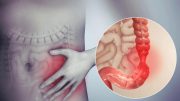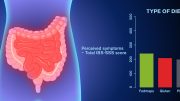
A new study indicates that certain gut conditions, such as constipation, difficulty swallowing, and IBS without diarrhea, may predict the development of Parkinson’s disease. The study analyzed data from a US medical record network, finding these gut issues to be more prevalent in individuals before being diagnosed with Parkinson’s.
Scientists discovered that certain gut conditions might serve as early indicators of Parkinson’s disease.
Research recently published in the journal Gut indicates that gastrointestinal issues like constipation, trouble swallowing, and irritable bowel syndrome (IBS) could be early indicators of Parkinson’s disease.
Gastrointestinal symptoms are thought to precede the development of cerebrovascular disease, such as stroke or a brain aneurysm, or Alzheimer’s disease, and it has been suggested (Braak’s hypothesis) that gut conditions may precede the development of Parkinson’s disease too.
To test this hypothesis, the researchers used data from a US nationwide medical record network (TriNetX) to compare 24, 624 people who had been diagnosed with Parkinson’s disease of unknown cause with those who had been diagnosed with other neurological conditions—Alzheimer’s disease (19,046) or cerebrovascular disease (23,942)—or with none of these (24,624; comparison group).
Those with Parkinson’s disease were matched with people in the other groups for age, sex, race and ethnicity, and length of diagnosis to compare the frequency of gut conditions included in their electronic health record for an average of 6 years before their Parkinson’s disease diagnosis.
The researchers then tested the same hypothesis, but in a different way, by dividing all the adults in the network who had been diagnosed with any of 18 gut conditions into separate groups—one for each condition of interest.
People in these groups were matched with people without the particular gut condition and monitored via their medical records for 5 years to see how many of them developed Parkinson’s disease or other neurological disorders.
Both analyses indicated that 4 gut conditions were associated with a higher risk of a Parkinson’s disease diagnosis.
Specifically, gastroparesis (delayed stomach emptying), dysphagia (difficulty swallowing), and constipation were all associated with a more than doubled risk of Parkinson’s disease in the 5 years preceding the diagnosis, while IBS without diarrhea was associated with a 17% higher risk.
Appendix removal, however, seemed to be protective, prompting questions about its potential role in the disease processes leading to Parkinson’s disease, say the researchers.
Neither inflammatory bowel disease nor vagotomy (removal of all or part of the vagus nerve to treat peptic ulcer) were associated with a heightened risk.
Some other gut issues, including functional dyspepsia (burning sensation or fullness of the stomach with no obvious cause); IBS with diarrhea; and diarrhea plus fecal incontinence, were also more prevalent among people who developed Parkinson’s disease.
However, these conditions were also more prevalent before the onset of Alzheimer’s disease or cerebrovascular disease.
This is an observational study, and as such, can’t establish cause. The researchers also highlight several limitations to their findings, including that the monitoring period was relatively short and that the diagnostic information captured in electronic health records might have been incomplete.
Nevertheless, they conclude: “This study is the first to establish substantial observational evidence that the clinical diagnosis of not only constipation but also dysphagia, gastroparesis, and irritable bowel syndrome without diarrhea might specifically predict the development of Parkinson’s disease.”
They add: “These findings warrant alertness for [gastrointestinal] syndromes in patients at higher risk for Parkinson’s disease and highlight the need for further investigation of [gastrointestinal] precedents in Alzheimer’s disease and cerebrovascular disease.”
Reference: “Gastrointestinal syndromes preceding a diagnosis of Parkinson’s disease: testing Braak’s hypothesis using a nationwide database for comparison with Alzheimer’s disease and cerebrovascular diseases” by Bo Konings, Luisa Villatoro, Jef Van den Eynde, Guillermo Barahona, Robert Burns, Megan McKnight, Ken Hui, Gayane Yenokyan, Jan Tack and Pankaj Jay Pasricha, 24 August 2023, Gut.
DOI: 10.1136/gutjnl-2023-329685









Be the first to comment on "Difficulty Swallowing? It Could Be an Early Warning Sign of Parkinson’s Disease"